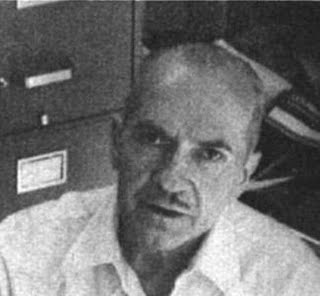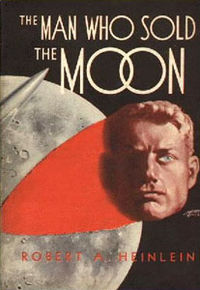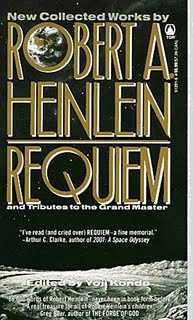 I always come back to Heinlein and I always will.
I always come back to Heinlein and I always will.
Requiem is a posthumous collection/anthology honoring the great Robert A. Heinlein. It’s full of rare stories, essays, speeches and tributes from other luminaries of SF. I never got around to reading it, but I picked up a copy at a library sale last weekend for a dollar. A nice, mint hardcover.
I always carry books in my car. Usually I have the one I’m currently reading, but I forgot to bring His Father’s Son with me when I went to the movies yesterday afternoon. I had Requiem with me and I got to the movies about 40 minutes early. I have a pathological fear that I’ll be late for things. Traffic, whatever.
I had read the lead story in Requiem before. It’s called Requiem and it’s such a lovely little tale. Requiem has the old sense of wonder in it, but unlike a lot of stuff that also does, it is mature and deeply moving.
I read Requiem before going into the theater and once again I was moved by it. The story is a sequel to Heinlein’s classic novella, The Man Who Sold the Moon. In that one, a man is driven by his love for the stars and builds a business in rocketry. He is successful beyond his wildest dreams, but those dreams turn into nightmares when the stockholders bar him from any space travel of his own. They need their cash cow to keep the profits coming in.
In Requiem, the man, Delos David Harriman, is old, but he has never lost his passion, his desire to touch the stars. Or at least set foot on the moon. He bribes, breaks the law and finagles a way to get there. But the trip is not without its price. A price Harriman is all too happy to pay.
The title, Requiem, describes Harriman’s journey and his destination. But it also serves as a testament for Heinlein’s own legacy. The author loved the stars his entire life, but he sadly was never able to make the trip his heart craved for. But his dreams, his vision, were instrumental in man’s courageous struggle into space.
Most reading at this site are not science fiction fans and I pity them. Pity them for missing out on all the marvelous work out there. But most of all I pity them for missing out on the magnificent career of Robert A. Heinlein, the greatest science fiction writer that ever lived. Admittedly some of RAH’s later, post Stranger in a Strange Land, fiction doesn’t work for me any more. But his classic writing from the 50’s is unparalleled, not only in the field of science fiction, but in all of literature.
No comments